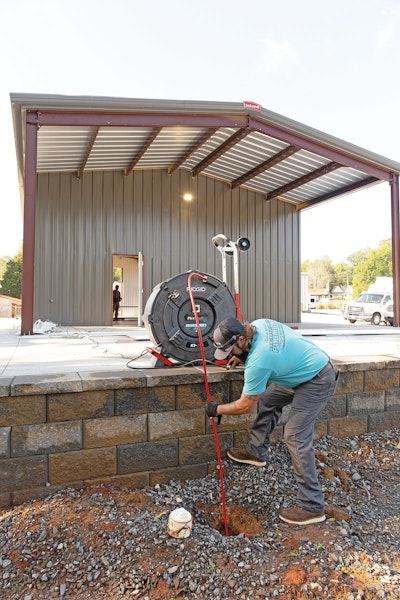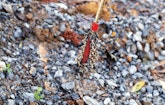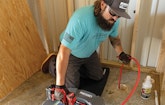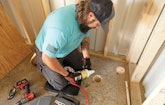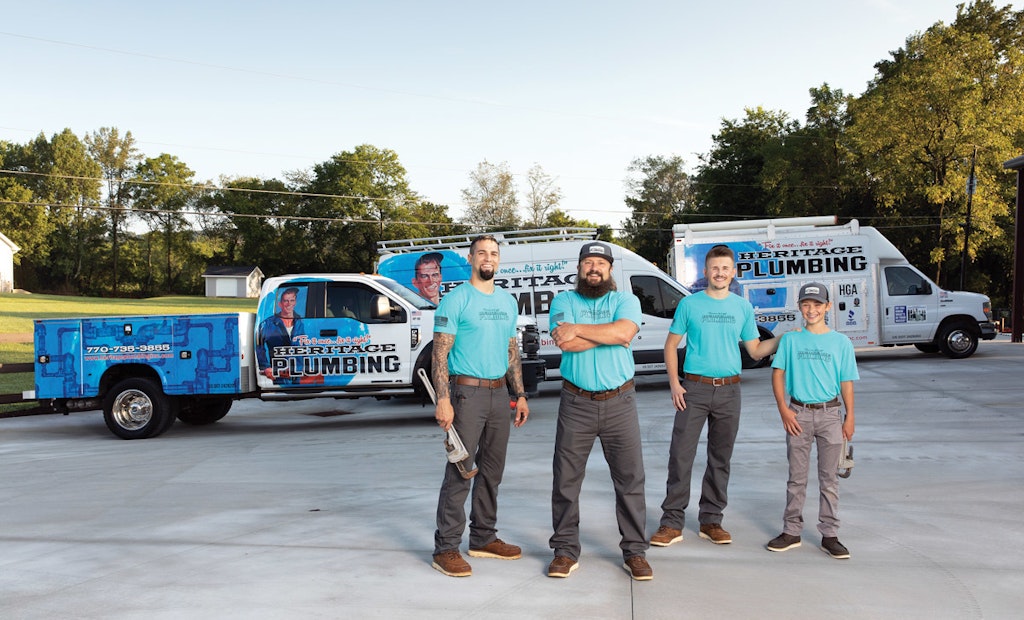
The team at Heritage Plumbing includes (from left) head plumbing tech and journeyman plumber Victor Lavallee, owner Tommy Phillips, apprentice plumber Mitchell Phillips and assistant Leland Martin.
Interested in Plumbing?
Get Plumbing articles, news and videos right in your inbox! Sign up now.
Plumbing + Get AlertsTommy Phillips got into plumbing because he grew up around it and enjoyed the trade. He got into septic tanks and cleaning drains and “whatever else you could think of in the service department” after the economy collapsed in 2008-09 and new residential plumbing jobs dried up. The transition to becoming a full-service plumbing house was easy for him.
“I believe when you are a plumber, you should know every aspect of the industry,” he says, looking back. “So, we just started adding to our plate any specialties that other companies in the area weren’t doing.”
Today Heritage Plumbing, located in Ball Ground, Georgia, tackles a host of residential and commercial plumbing jobs, as well as septic tank installation and maintenance, drain and sewer installation, repair and cleaning, the whole gamut of water heater work and everything in between, plus natural gas line installation and backfill prevention testing.
What Heritage won’t do, Phillips says, is to pretend to be something it isn’t. “We are still your small-town plumbing company. That was my goal from the start — not to be the biggest company, but to be genuine.”
Family tradition
Phillips got into handling pipe and working with his hands at a young age. One of the people he looked up to as a child was his grandfather, M.D. Garrett. Phillips remembers his grandfather always making something in his garage in the Georgia community of Woodstock.
Garrett was a former Lockheed Corp. employee and was comfortable working with electrical elements, HVAC units, plumbing materials and machining tools. If it could be done, Garrett could do it and his community trusted him doing it. Some of the imagery in Heritage Plumbing advertising is a tribute to Garrett.
If his grandfather wasn’t enough influence on the young man, four uncles on his mother’s side of the family each owned a plumbing shop. Today, six or seven nephews are working in the trade in one part of Georgia or another. “Plumbing is pretty much in the family,” he says.
Of most impact on Phillips was his father, who was a plumber. He worked for a plumbing firm and Phillips eventually was hired by the company to work alongside his father. In 1998, at the age of 23, Phillips decided to open his own business, Phillips Plumbing. His father continued in his own career but helped his son get started, as well.
In 2006, Phillips incorporated his company and changed the name to Heritage Plumbing.
Today, Phillips has five employees, but in the beginning, it was Phillips alone, supplemented by his father’s assistance. His wife, Lindsey, is the office manager. He playfully acknowledges his dependence on his partner in the office. “I’d be in trouble if I let her go. You know how hard it is to find help these days.”
The brand-new company strictly took on new construction plumbing work — plumbing concrete slabs, roughing out and finishing. When the housing crisis and resulting recession struck, Phillips adapted by getting a septic tank license to keep busy. Expansion of services at Heritage Plumbing began in earnest.
In 2021, 70% of the company’s business is residential plumbing services and new construction or remodeling work. The remainder is commercial jobs of one kind or another, including installing commercial sinks and servicing grease traps. “We do a lot of hair salons, doing one across the street this week,” he says. “We’ll saw out the concrete flooring and add hair-washing stations.”
Burned once by too much reliance on the new-construction segment, Phillips says he is “selective on whose construction projects we’ll work. We kept our relationship with the best builders and let the rest go.” While he says he might slightly prefer working the residential market, “plumbing is plumbing, if you know how to do it.”
Well equipped
Georgia is verdant but beneath some of that green is rock, including limestone and other sedimentary deposits. Ball Ground lies in northwest Georgia and, as Phillips says, the farther north in the state you go, the rockier the soil. “We put in a septic tank the other day, and, under the top layer, it was nothing but rock.”
So, spading a trench for a water or sewer line is not an option in some cases. As needed, Heritage Plumbing relies on a Kubota KX040 compact excavator. The 40 hp machine can cleave the earth with minimal stress, opening a trench for pipe laying or digging a hole up to 7 feet deep for a septic tank.
Other tools in the Heritage equipment yard include a RIDGID KJ-3100 jetter. “It’s not a large one, but it works for us,” Phillips says of the machine. The 3100 is a hand-cart model that can produce up to 5.5 gpm at 3,000 psi and works in lines ranging from 2 inches to 10 inches. It’s used exclusively in outside applications.
“It depends on what’s in the line, of course, but generally I don’t start out with the jetter. It’s a bulky piece of equipment.” Instead, Phillips or another team member first tries to clear an obstacle using a 700-watt K60 cable drain cleaning machine or a FlexShaft chain knocker machine. Both are RIDGID tools, as is the inspection camera for scoping out the work. When the pieces of clearing equipment can’t free up a line, the jetter is brought out, perhaps three or four times a month.
“Most of our equipment is RIDGID because of the relationship we’ve built over the years. They are very responsive, always helping us out when something goes wrong. They are pretty on top of having parts on hand. I prefer RIDGID as much for relationship reasons as anything,” Phillips says.
Heritage does not as yet do any trenchless repair work on lines, unless you count its waterline ripper. That process involves inserting a 100-foot-long Spartan waterline slitter cable into a faulty line. Then one of three splitter heads is attached to the end of it and the cable is pulled back through the line using a Ditch Witch machine. A new PVC, copper or poly line is dragged into place behind the splitter. The process works on lines up to 1 inch in diameter.
Phillips says Heritage Plumbing is known for repairing lines of all types without resorting to threading or torching the pipe to join segments. Instead, the company relies on Uponor ProPex fittings on expandable pipe. “We crimp a ring on it and insert an expansion tool in the pipe and have a secure connection. It costs more but we have used it for years. Good quality materials in return bring good results.”
The company frequently is called on to add gas lines to pool areas or commercial kitchens and, again, relies on a non-threading system to join pipes. In this case, Phillips turns to a Viega ProPress system for copper and stainless steel pipes and MegaPress for carbon steel pipe. “We are sort of known for our capability to press water and gas lines.”
Another specialty is installing water filter systems. The region has fairly hard water, according to Phillips, with people drawing it from wells. Heritage technicians take a sample of water at a residence and send it to the University of Georgia for a full report on the water’s composition.
“We know what the safe ranges are for components of the water so we can design and build a filter system for a particular customer,” Phillips says. Each system has a tank containing the filtering media that remove iron particles and such. A valve at the top of the tank periodically emits backwashed water, sending it out into a septic tank or elsewhere. “We build and put in a filter system like that once or twice a month.”
Credentials worth the cost
Heritage Plumbing sets itself apart from equally professional competitors by earning credentials. Phillips holds a master plumber license, as does another member of his crew. One apprentice has his journeyman license and a second will take that test in two months.
Furthermore, Phillips is certified to work on septic tanks and with medical gas lines, and certified to test backflow prevention units and install Gastite flexible gas pipes. He’s OSHA-certified, Department of Health and Environmental Control-certified and certified to work in confined spaces.
“All of the certification gets pretty time-consuming, especially at the end of a certified period. I spent lots of time in front of a computer,” he acknowledges. “It gets pretty costly, too.”
But it’s worth the cost. Besides the skills honed and knowledge earned to acquire certification, it’s another way of winning the confidence of his customers. For the same reason, Heritage Plumbing crew members do not count on commissions as part of their salaries.
“Most plumbing companies do have commissions, especially on service calls. Their guys have to go out there and sell everything on their truck to make money. So, this is part of building relationships with customers. Not having the guys on commission gives our customers a little sense that we are not coming out to gouge them.”
For going-the-extra-mile customer service, Heritage Plumbing also arranges for cleanup when its plumbers have to tear into walls to replace old or leaking pipe. “Repipes, we call the jobs,” Phillips says. After the piping is fixed, the walls need fixing. Phillips has a guy on call who hangs new sheet rock or repairs the old, including finishing the mudded joints. “All the homeowner has to get is a painter.”
The pandemic disrupted things for Heritage Plumbing like it did for many other businesses, the most critical problem being interruption in the supply of parts and products. Phillips says the dislocation was felt “across the board. Pipe fittings and PVC — we switch back and forth depending upon on what we can get. We couldn’t get some products for water heaters. A month ago, I couldn’t get the resin I need for the chambers in septic tanks.”
Aggravation aside, the company is pressing on. “We’re hanging in there, but it’s been rough. It’s good to be able to do different kinds of jobs. Situations like this are one reason we got into learning how to do a lot of different things.”
